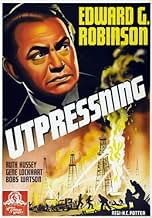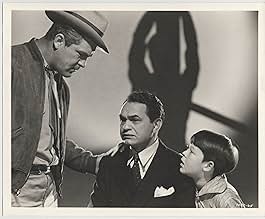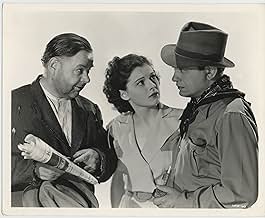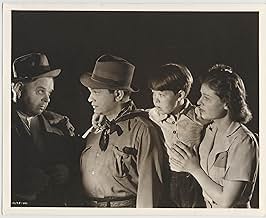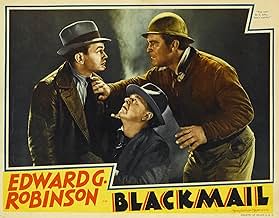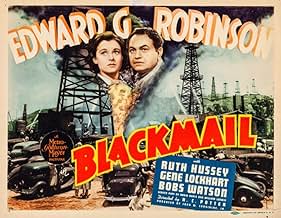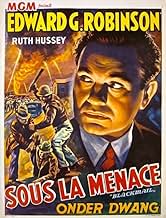Ajouter une intrigue dans votre langueJohn Ingram, successful oil field firefighter, is really a chain gang escapee. Someone out of his past finds him.John Ingram, successful oil field firefighter, is really a chain gang escapee. Someone out of his past finds him.John Ingram, successful oil field firefighter, is really a chain gang escapee. Someone out of his past finds him.
- Réalisation
- Scénario
- Casting principal
Guinn 'Big Boy' Williams
- Moose McCarthy
- (as Guinn Williams)
Lew Harvey
- Workman
- (scènes coupées)
Mitchell Lewis
- Workman
- (scènes coupées)
Ted Oliver
- Workman
- (scènes coupées)
Lee Phelps
- Guard
- (scènes coupées)
Trevor Bardette
- Southern Deputy
- (non crédité)
Willie Best
- Bunny - the Janitor
- (non crédité)
Stanley Blystone
- Oil Worker
- (non crédité)
Wade Boteler
- Police Sergeant
- (non crédité)
Ed Brady
- Prisoner Worrying About Dick Tracy
- (non crédité)
Avis à la une
Here's to You Mr. Robinson. Even when Slightly Miscast and Upstaged by the Villain Edward G. managed to put Verve and Gusto in any Role. Here he goes from Family Man to a Rage Filled, Revenge Seeking Psycho Hell Bent on Saving His Family and Fortune from a Slimy and Totally Repugnant former "Friend".
There are some Minor Cringe-Inducements mostly at the Beginning with some Comedy Relief and Smarmy Family Stuff, but Once the Blackmailer Shows Up Things Kick into Overdrive and there are some Very Effective Chain Gang Scenes and a Suspenseful Escape.
The Oil Fires are Realistic and this is one of the Few Times that MGM tried to be Gritty and Deliver a Message. They were Aping Warner Brothers and did a Pretty Good Imitation.
There are some Minor Cringe-Inducements mostly at the Beginning with some Comedy Relief and Smarmy Family Stuff, but Once the Blackmailer Shows Up Things Kick into Overdrive and there are some Very Effective Chain Gang Scenes and a Suspenseful Escape.
The Oil Fires are Realistic and this is one of the Few Times that MGM tried to be Gritty and Deliver a Message. They were Aping Warner Brothers and did a Pretty Good Imitation.
**SPOILERS** Having made a success of himself in the fire-fighting business in Oklahoma putting out oil well fires John Ingram,Edward G. Robinson,had it all. A booming business at the hight of the great depression a beautiful wife and darling nine-year-old son Helen & Hank, Ruth Hussey & Bobs Watson,who thought the world of him and the respect and admiration of the entire community. John he also had something that could destroy everything he achieved and worked for the last nine years, a dark and mysterious past.
Being convicted of breaking into the safe of his employer and having the stolen money found under his mattress John Ingram, who's real name is John Harrington,was sent to work on a prison chain-gang for five years. Escaping from prison John made his way to Oklahoma and started a new life and now with his old friend Bill Ramey, Gene Lochart, showing up on the scene that new life,as well as his freedom,is about to end. John giving Bill a job on his oil well to keep him quite about his past doesn't at all seem to work when Bill starts to put the squeeze on him for money and demands $25,000.00 to keep his mouth shut. John not having that much cash agrees to give Bill $5,000.00, his entire life savings, when Bill reveals the truth about the robbery that put John away and caused him to become a fugitive from the law. He was the man who broke into the safe and hid the stolen cash under John's mattress.
Having the $5,000.00 bank check sent to Bill's hotel and Bill having his confession sent by mail to the local police department would free John from being hunted by the police. It will also give Bill, a homeless vagabond, the security of living out his last years after he serves out the five year sentence that John was straddled with. As you would expect Bill doubled-crossed his friend and had him put back behind bars and his oil well taken over by Bill who used the blackmail money, that John gave him, to buy him out while he was doing his time with the chain-gang.
Determined at first to do his five years and then get back to his wife and child, as well as his fire-fighting business, John realizes that he has nothing to come back to with Bill buying him out and throwing his wife and son out of their home and on the street. Getting letters from Helen about how fine everything is John knows that things are a lot worse then the news he's been getting from her when he has a talk with his lawyer and co-owner of his business Moose McCarthy,Guinn "Big Bill" Williams. "Big Bill" broke the bad news about the raw deal John got both here in the chain-gang and at home due to the sleazy actions of his "friend" Bill Ramey.
Breaking out of jail with fellow prisoner Diggs(John Wray), who ends up getting shot and killed, John makes his way back home to Oklahoma. John's determined to settle the score with that lowlife Bill Ramey and get him to confess his sins, or better yet, and crimes that sent him away not once but twice to serve hard time in a southern chain-gang for crimes that he didn't commit.
Edward G. Robinson, in a good-guy role for once, is very good as the maligned and wrongly convicted John Ingram. The ending of the movie, even though very contrived and predictable, is very effective and rewarding to both John and his family, as well as the movie audience. John beats a confession out of Bill Ramey by forcing him to face the hell that he faces and faced every time he went to work putting out dangerous oil well fires.
Being convicted of breaking into the safe of his employer and having the stolen money found under his mattress John Ingram, who's real name is John Harrington,was sent to work on a prison chain-gang for five years. Escaping from prison John made his way to Oklahoma and started a new life and now with his old friend Bill Ramey, Gene Lochart, showing up on the scene that new life,as well as his freedom,is about to end. John giving Bill a job on his oil well to keep him quite about his past doesn't at all seem to work when Bill starts to put the squeeze on him for money and demands $25,000.00 to keep his mouth shut. John not having that much cash agrees to give Bill $5,000.00, his entire life savings, when Bill reveals the truth about the robbery that put John away and caused him to become a fugitive from the law. He was the man who broke into the safe and hid the stolen cash under John's mattress.
Having the $5,000.00 bank check sent to Bill's hotel and Bill having his confession sent by mail to the local police department would free John from being hunted by the police. It will also give Bill, a homeless vagabond, the security of living out his last years after he serves out the five year sentence that John was straddled with. As you would expect Bill doubled-crossed his friend and had him put back behind bars and his oil well taken over by Bill who used the blackmail money, that John gave him, to buy him out while he was doing his time with the chain-gang.
Determined at first to do his five years and then get back to his wife and child, as well as his fire-fighting business, John realizes that he has nothing to come back to with Bill buying him out and throwing his wife and son out of their home and on the street. Getting letters from Helen about how fine everything is John knows that things are a lot worse then the news he's been getting from her when he has a talk with his lawyer and co-owner of his business Moose McCarthy,Guinn "Big Bill" Williams. "Big Bill" broke the bad news about the raw deal John got both here in the chain-gang and at home due to the sleazy actions of his "friend" Bill Ramey.
Breaking out of jail with fellow prisoner Diggs(John Wray), who ends up getting shot and killed, John makes his way back home to Oklahoma. John's determined to settle the score with that lowlife Bill Ramey and get him to confess his sins, or better yet, and crimes that sent him away not once but twice to serve hard time in a southern chain-gang for crimes that he didn't commit.
Edward G. Robinson, in a good-guy role for once, is very good as the maligned and wrongly convicted John Ingram. The ending of the movie, even though very contrived and predictable, is very effective and rewarding to both John and his family, as well as the movie audience. John beats a confession out of Bill Ramey by forcing him to face the hell that he faces and faced every time he went to work putting out dangerous oil well fires.
Edward G. Robinson here is a victim of "Blackmail," a 1939 film starring Robinson, Ruth Hussey, and Gene Lockhart.
Ingram (Robinson, his wife (Hussey) and his son (Bobs Watson, known as the "Crybaby of Hollywood") live in Oklahoma, where Ingram fights oil fires He's considered one of the best. But he has a secret - nine years earlier, under another name, he was on a chain gang for something he didn't do, and he escaped.
All is well until William Ramey (Lockhart), someone from his past, shows up and blackmails him, using the promise of getting Ingram cleared, since it was he who committed the crime. However, he double crosses Ingram, who ends up back on a chain gang.
Ingram decides that this time, he will do his full sentence. Things happen to change his mind.
Gritty drama with Robinson suffering as only he can. Like Bogart, he could be mean as dirt or a sympathetic character. Here he's tough, caring, and sympathetic. Ruth Hussey gives a lovely performance as his wife, and I admit that Bobs Watson was so pathetic when he cried that I cried. He became a Methodist minister but kept acting as well.
Though the acting is effective, this is a routine drama. The actors keep you involved.
Ingram (Robinson, his wife (Hussey) and his son (Bobs Watson, known as the "Crybaby of Hollywood") live in Oklahoma, where Ingram fights oil fires He's considered one of the best. But he has a secret - nine years earlier, under another name, he was on a chain gang for something he didn't do, and he escaped.
All is well until William Ramey (Lockhart), someone from his past, shows up and blackmails him, using the promise of getting Ingram cleared, since it was he who committed the crime. However, he double crosses Ingram, who ends up back on a chain gang.
Ingram decides that this time, he will do his full sentence. Things happen to change his mind.
Gritty drama with Robinson suffering as only he can. Like Bogart, he could be mean as dirt or a sympathetic character. Here he's tough, caring, and sympathetic. Ruth Hussey gives a lovely performance as his wife, and I admit that Bobs Watson was so pathetic when he cried that I cried. He became a Methodist minister but kept acting as well.
Though the acting is effective, this is a routine drama. The actors keep you involved.
This film starts with a bang - literally. It also ends with a bang. You see Edward G is an oil-fire fighter in Oklahoma - and he's doing really well. Great job (if a little dangerous), great house, great wife, great kid. Trouble is he is actually a fugitive from a chain gang - and his past is about to catch up with him. A shame it does really because the scenes of Eddy walking fearlessly into fire-balls are unforgettable. A story about the lives of oil-fire-fighters would have been a lot more interesting than the rather dull blackmail leading to a return to chain gang stuff. The chain gang scenes never live up to those of the masterpiece "I am a Fugitive from a Chain Gang" - but I wouldn't be surprised if Hitler got a few ideas on his slave labor camps from this film. Were the chain gangs of the thirties really this brutal? If so there were a few "war criminals" in the Southern USA.
Anyway the film drifts back to oil fires at the end - and the climax is really spectacular. It is enhanced by Ed's magnificent performance, and an unforgettable snivelling evil performance from Gene Lockhart. Both rise above the ordinary material. Also impressive is Guinn Williams, but the very talented Ruth Hussey is given little to do but look worried, and Bobs Watson is VILE as the cry-baby son. All in all good MGM entertainment, with some great sequences.
Anyway the film drifts back to oil fires at the end - and the climax is really spectacular. It is enhanced by Ed's magnificent performance, and an unforgettable snivelling evil performance from Gene Lockhart. Both rise above the ordinary material. Also impressive is Guinn Williams, but the very talented Ruth Hussey is given little to do but look worried, and Bobs Watson is VILE as the cry-baby son. All in all good MGM entertainment, with some great sequences.
Poor title for what is a movie patterned on "I Was A Fugitive From A Chain Gang." It would appear that some of the shots were either taken from that masterpiece or re-done virtually identically with new cast. Edward G. Robinson is presented in the Paul Muni role but this time the hero has been willfully framed -- not wrongfully convicted. This framing is necessary for the rest of the story line and the plot unfolds as believable. Gene Lockhart steals the show in his portrayal of the villain. Robinson never looks as gaunt as Muni and is less convincing as someone who has suffered on the chain gang. Watching Robinson's rotund body run through the swamps just doesn't hack it. If given a choice, see the Muni movie but this one will serve for those who prefer a different ending. A better title might have been "Vengeance."
Le saviez-vous
- AnecdotesThis film received its USA television premiere in Los Angeles Friday 16 November 1956 on KTTV (Channel 11), followed by Philadelphia Monday 19 November 1956 on WFIL (Channel 6); it first aired in New Haven CT 3 December 1956 on WNHC (Channel 8), in New York City 15 December 1956 on WCBS (Channel 2) , in Portland OR 2 January 1957 on KGW (Channel 8), in Chicago 16 January 1957 on WBBM (Channel 2), in Altoona PA 15 April 1957 on WFBG (Channel 10), in Minneapolis 1 May 1957 on KMGM (Channel 9), in Abilene TX 20 May 1957 on KRBC (Channel 9), in Phoenix 28 July 1957 on KPHO (Channel 5), in Memphis 5 August 1957 on WHBQ (Channel 13), in Miami 14 August 1957 on WCKT (Channel 7), in Tampa 1 October 1957 on WFLA (Channel 8), in Cincinnati 2 November 1957 on WLW-T (Channel 5), in Columbus 23 November 1957 on WLW-C (Channel 3), in Indianapolis 9 December 1957 on WLW-I (Channel 13), in Fresno CA 16 December 1957 on KMJ (Channel 24), in Honolulu 3 January 1958 on KHVH (Channel 13), and in San Francisco 20 January 1958 on KGO (Channel 7).
- GaffesWhen John returns home after escaping, he pulls down the shade on the window over the kitchen sink, but leaves it a few inches above the windowsill, then embraces his wife. In the next close-up of the embrace the shade is fully closed down to the sill.
- ConnexionsFeatured in From the Ends of the Earth (1939)
Meilleurs choix
Connectez-vous pour évaluer et suivre la liste de favoris afin de recevoir des recommandations personnalisées
Détails
- Durée
- 1h 21min(81 min)
- Couleur
- Rapport de forme
- 1.37 : 1
Contribuer à cette page
Suggérer une modification ou ajouter du contenu manquant

